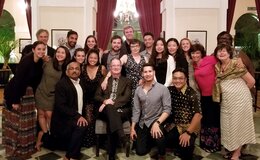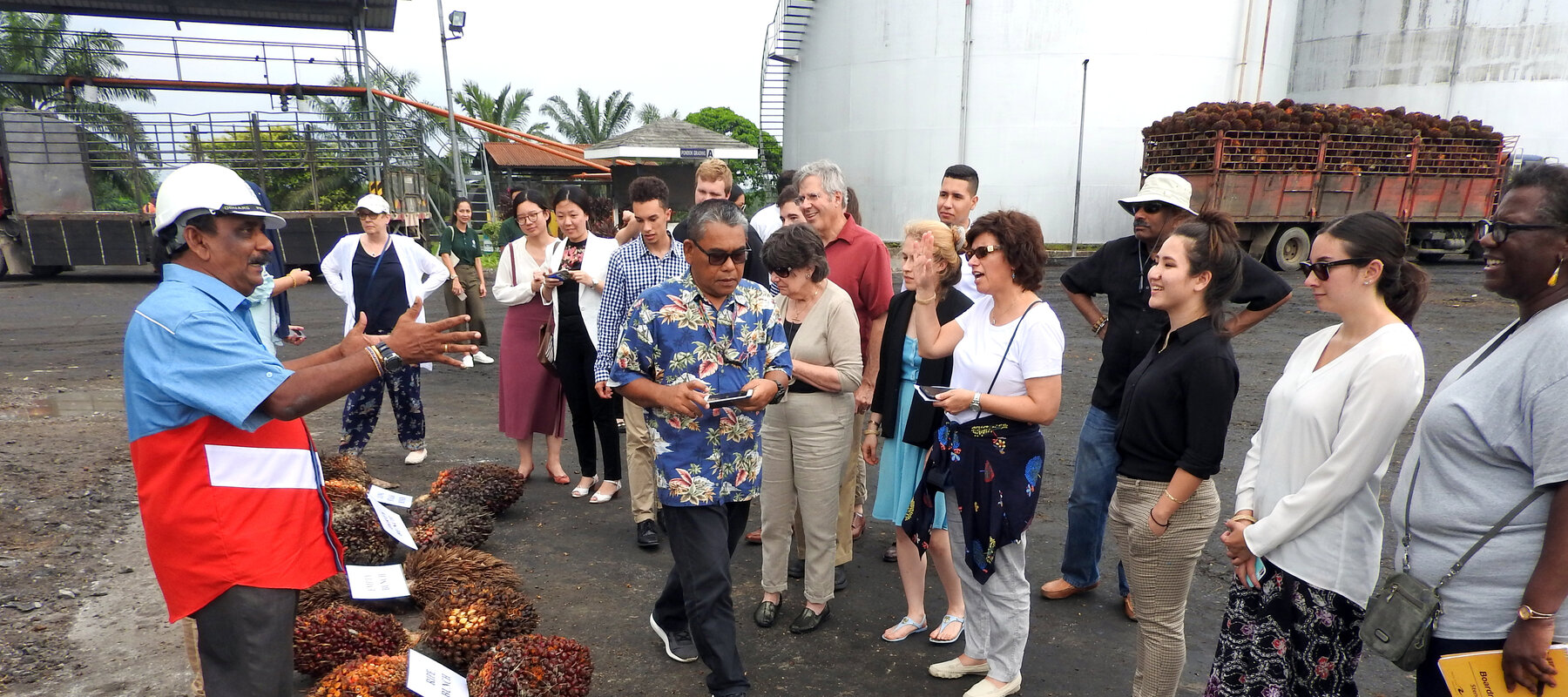The United Kingdom one year after the Brexit vote. Greece in the midst of a historic debt crisis. Mexico at the signing of the North American Free Trade Agreement.
Each year, students in the Martindale Student Associates Honors Program study the economic and social issues facing a foreign nation. They don’t just read about the country – they go there and meet with everyone from high-level ministers to everyday people to learn about the issues first-hand.
The 15-month fully funded honors program is the flagship program of the Martindale Center for the Study of Private Enterprise. Since it began in 1986, students have visited 26 countries, often at critical times in their history, and several regions of the United States.
“Martindale was global before global was cool,” says Todd Watkins, Arthur F. Searing Professor of Economics and director of the Martindale Center.
The program is open to students in any of Lehigh’s three undergraduate colleges – the current cohort includes students majoring in accounting and finance, behavioral neuroscience and psychology, chemical engineering, and English and political science.
After a briefing visit with the U.S. State Department and the focus country’s diplomats in Washington, DC, the students travel to the country for 10 to 12 days and tour government ministries, corporations, think tanks, social organizations and more. Then they spend their senior year writing an academic article, working closely with faculty and alumni mentors until it’s ready to be published in the program’s annual journal, Perspectives on Business and Economics.
Martindale didn’t just add to my Lehigh experience, it was the spark that made it all ‘click.’
“I’ve led study abroad programs before, but this is different, because of the emphasis beyond the travel, on research, mentoring and networking” says Watkins. “We really push students to develop their communications skills and write at a professional level. They’re proud when they finish because they’ve done something substantive and said something that no one’s said before.”
A Chance to Research an International Issue on the Ground…
“This process is not something that a lot of people get to say they did in college,” says Caroline Weisstuch ’19, part of the 2018-2019 cohort that visited Malaysia in May 2018. She heard about the program from her mother, Faith Glazier ’87, who went to Canada with the first Martindale cohort in 1986.
“My research examines the factors that led to the most recent general election in Malaysia,” Weisstuch says. “We traveled there right after the first peaceful transfer of power between political parties in their modern history. I got to hear people’s hopes for the future of their country. These first-hand accounts are the basis of my research paper.”
Weisstuch is in the IDEAS (Integrated Degree in Engineering, Arts and Sciences) program, studying environmental engineering and political science. She says the program helped her tie her two majors together, drawing on the research and analytical skills she developed in engineering and the communication and interpersonal skills she’s learned from political science. And it allowed her to have an international experience when it wouldn’t otherwise fit in her schedule.
Phillip Hernandez ’19, a finance major also in the 2018-2019 cohort, had already studied abroad. With minors in Spanish and Latin American studies, he has a particular interest in Central and South America – he joined Lehigh in Costa Rica in 2017 and will go to Cuba with Lehigh this winter. At first, he was unsure about going to Malaysia.
“But what attracted me was the academic aspect, the opportunity to research an issue in a particular country and then publish your work,” he says. “Research has been something I’ve always wanted to tailor to my studies.”
Hernandez’s article will analyze the social and economic effects of foreign direct investment in Malaysia from China.
“Going to Malaysia gave me a global perspective,” he says. “I didn’t know the language and the culture is very different. It got me out of my comfort zone. It was an experience I really cherish.”

… And Build Connections that Last a Lifetime
Because the program is so intense, participants form close relationships with each other and their faculty and alumni mentors. These bonds don’t end when they graduate.
“I made connections with professors and friends that I’m still in touch with today,” says Sarat Sethi ’92, who received a bachelor’s degree in accounting from Lehigh in 1992 and an MBA from Harvard Business School in 1997.
He was part of the 1991-1992 cohort, traveling to Czechoslovakia at a key time between the “Velvet Revolution” in 1989 when the country transitioned from communism to democracy and 1993, when it split into the Czech Republic and Slovakia. His research examined joint ventures in the country as it was opening up to foreign investment.
“It was a unique and very interesting program that offered the opportunity to go overseas and work with fabulous professors,” he says. “I realized there is a much bigger world outside my own experience.”
The connections Sethi made in the program even helped lead to his career. Richard Aronson, the founding director of the Martindale Center, introduced him to Doug Lane ’67, and he joined Lane’s investment advisory firm in 1999. He is now a managing partner there, as well as a Lehigh trustee and the president of the Martindale Society, a community of alumni and friends that gathers at annual events and supports the program.
“It was such a great experience for me and added to my education,” Sethi Says. “Now I can give back and students can learn from my experiences.”
Ashley Pritchard ’09 goes one step further.
“Martindale didn’t just add to my Lehigh experience, it was the spark that made it all ‘click,’” she says.
Pritchard majored in political science and economics and was part of the 2008-2009 cohort that visited New Zealand, where she studied the intersections of xenophobia, immigration policy and economic development. She says the experience was her first real exposure to foreign affairs and diplomacy.
“At Lehigh, I first learned about international politics and theory through textbooks and teaching,” she says. “Martindale made it all real and gave me the stepping stone to start my career.”
After she graduated, Pritchard worked at the United Nations and then received a Rotary Ambassadorial Scholarship to get her master’s degree in international development in Thailand. She spent the last seven years in Myanmar, first educating voters in advance of the country’s first democratic election in 50 years and then managing Rohingya refugee camps on the border with Bangladesh. All along the way, her Martindale connections helped her.
“Alumni from the Martindale program continue to open new doors and test new boundaries in the international field,” she says. “They continue to be individuals whom I look up to and respect in my career, and they are constantly willing to help each other.”
And when she sat in a meeting with Aung San Suu Kyi, the politician and Nobel Peace Prize laureate from Myanmar, and President Barack Obama, the first sitting U.S. president to visit that country, Pritchard says, “I smiled, remembering my first encounter with international dignitaries was all thanks to the Martindale program.”
